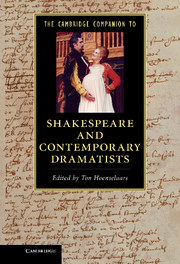Book contents
- Frontmatter
- Contents
- Illustrations
- Contributors
- Preface
- Chronology of the life and work of Shakespeare and contemporary dramatists
- 1 John Lyly and the University Wits
- 2 Thomas Kyd and the Elizabethan blockbuster
- 3 ‘The words of Mercury’
- 4 The dyer’s hand
- 5 Urbane John Marston
- 6 Thomas Dekker and the emergence of city comedy
- 7 Shakespeare
- 8 Thomas Heywood
- 9 George Chapman’s learned drama
- 10 Francis Beaumont and John Fletcher’s tragicomedy as musical melodrama
- 11 Thomas Middleton and the early modern theatre
- 12 John Webster
- 13 John Ford
- 14 Philip Massinger
- 15 Richard Brome and the idea of a Caroline theatre
- 16 Troublesome histories
- Select bibliography
- Index
- References
4 - The dyer’s hand
Shakespeare and Jonson
Published online by Cambridge University Press: 05 December 2012
- Frontmatter
- Contents
- Illustrations
- Contributors
- Preface
- Chronology of the life and work of Shakespeare and contemporary dramatists
- 1 John Lyly and the University Wits
- 2 Thomas Kyd and the Elizabethan blockbuster
- 3 ‘The words of Mercury’
- 4 The dyer’s hand
- 5 Urbane John Marston
- 6 Thomas Dekker and the emergence of city comedy
- 7 Shakespeare
- 8 Thomas Heywood
- 9 George Chapman’s learned drama
- 10 Francis Beaumont and John Fletcher’s tragicomedy as musical melodrama
- 11 Thomas Middleton and the early modern theatre
- 12 John Webster
- 13 John Ford
- 14 Philip Massinger
- 15 Richard Brome and the idea of a Caroline theatre
- 16 Troublesome histories
- Select bibliography
- Index
- References
Summary
The tradition of contrasting Shakespeare and Jonson as exemplifying nature and art, usually to Jonson’s disadvantage, began in the seventeenth century and remained critical orthodoxy throughout the eighteenth and nineteenth centuries. To Milton in ‘L’Allegro’, Jonson is ‘learned’, where ‘sweetest Shakespeare fancy’s child’ can spontaneously ‘warble his native woodnotes wild’. Dryden includes an extensive comparison of these two ‘Rivalls in Poesie’ in his ‘Essay Of Dramatic Poesy’ (1667): Jonson is ‘the most learned and judicious Writer which any Theater ever had’, ‘deeply conversant in the Ancients, both Greek and Latine’, and ‘a most severe Judge of himself as well as others’, while Shakespeare, in contrast, ‘needed not the spectacles of Books to read Nature; he look’d inwards, and found her there’. Dryden continues:
If I would compare him with Shakespeare, I must acknowledge him the more correct Poet, but Shakespeare the greater wit. Shakespeare was the Homer, or Father of our Dramatick Poets; Johnson was the Virgil, the pattern of elaborate writing; I admire him, but I love Shakespeare.
- Type
- Chapter
- Information
- Publisher: Cambridge University PressPrint publication year: 2012
References
- 1
- Cited by

